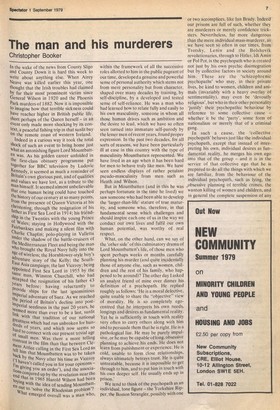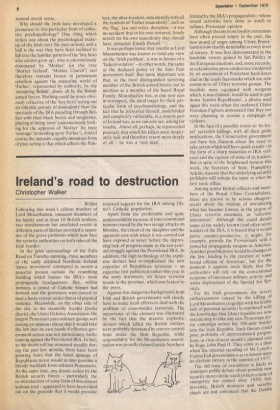The man and his murderers
Christopher Booker
In the wake of the news from County Sligo and County Down it is hard this week to write about anything else. When Airey Neave was killed earlier this year, one thought that the Irish troubles had claimed by far their most prominent victim since General Wilson in 1920 and the Phoenix Park murders of 1882. Now it is impossible to imagine how that terrible sickness could have reacher higher in British public life, Short perhaps of the Queen herself in an event only made more shocking by its context, a peaceful fishing trip in that sunlit bay On the remote coast of western Ireland.
Indeed in a curious way it took the total Shock of such an event to bring home just What an astonishing figure Lord Mountbatten was. As his golden career unfolded in the first-class obituary programme put together for BBC television by Ludovic Kennedy, it seemed as much a reminder of Britain's own glorious past, and of qualities and values we have lost, as a tribute to the Than himself. It seemed almost unbelievable that one human being could have touched the history of our century at so many points, from the presence of Queen Victoria at his Christening, through the resignation of his father as First Sea Lord in 1914; his friendShip in the Twenties with the young Prince Wales; staying in Hollywood with the rairbankses and making a silent film with Charlie Chaplin; polo-playing in Valletta tinder the shadow of the battle-cruisers of the Mediterranean Fleet and being the man Who brought the Royal Navy fully into the age of wireless; the Hornblower-style boy's adventure story of the Kelly; the Southtast Asia campaign; the last Viceroy; being aPPointed First Sea Lord in 1955 by the same man, Winston Churchill, who had accepted the resignation of his father 43 Years before; having reluctantly to Provide ships for the last ignominious tPerial adventure of Suez. As we reached the period of Britain's decline into postimperial seediness in the past 20 years, he pec,ated more than ever to be a last, sunlit vvith that tradition of our national great ness which had run unbroken for hundreds of years, and which now seems so hard to connect with our present trivial age Of staall men. Was there a more telling Contrast in the film than that between Clem. e.nt.Attlee calling in the First Sea Lord to 'ell him that Mountbatten was to be taken back by the Navy after his time as Viceroy 1,1 haven't called you in for your opinions — %13a giving you an order'), and the associareit: conjured up by the revelation near the t_ that in 1965 Harold Wilson had been e"...Ylag with the idea of sending Mountbatt",,,„oat to 'solve the Rhodesian problem'? What emerged overall was a man who' within the framework of all the successive roles allotted to him in the public pageant of our time, developed a genuine and powerful sense of personal authority which stems not from mere personality but from character, shaped over many decades by training, by self-discipline, by a developed and tested sense of self-reliance. He was a man who had learned how to relate fully and easily to his own masculinity, someone in whom all those human drives such as ambition and the desire to lead, which we have so often seen turned into immature self-parody by the lesser men of recent years, found proper expression. In the past two decades, for all sorts of reasons, we have been particularly ill at ease in this country with the type of masculinity Mountbatten represented. We have lived in an age when it has been hard for men to behave truly like men. We have seen endless displays of rather petulant pseudo-masculinity from men such as Heath and Wilson.
But in Mountbatten (and in this he was perhaps fortunate in the time he lived) we saw someone who had been able to develop the larger-than-life' stature of true maturity, and someone who, therefore, in that fundamental sense which challenges and should inspire each one of us in the way we conduct our own lives and fulfil our own human potential, was worthy of real respect.
What, on the other hand, can we say of the 'other side' of this culminatory drama of Lord Mountbatten's life, of those men who spent perhaps weeks or months carefully planning his murder (and quite incidentally those of anyone else, such as women, children and the rest of his family, who happened to be around)? The other day I asked an analyst friend of mine over dinner his definition of a psychopath. He replied roughly as follows: 'He is a moral defective, quite unable to share the "objective" view of morality. He is so completely egocentred that he interprets his own needs, longings and desires as fundamental reality. Yet he is sufficiently in touch with reality very often to carry others along with him and to persuade them that he is right. He is a pathological liar. He may be purely impulsive, or he may be capable of long, obsessive planning to achieve his ends. He does not learn from punishment or experience. He is cold, unable to form close relationships, always ultimately betrays trust. He is quite untreatable, because it is impossible to get through to him, and to put him in touch with his own deeper self. He usually ends up in prison.'
We tend to think of the psychopath as an individual, lone figure — the Yorkshire Ripper, the Boston Strangler, possibly with one or two accomplices, like Ian Brady. Indeed our prisons are full of such, whether they are murderers or merely confidence tricksters. Nevertheless, far more dangerous than the mere individual mass-murderer, as we have seen so often in our times, from Trotsky, Lenin and the Bolshevik revolutionaries, through to Hitler, ldi Amin or Pol Pot, is the psychopath who is created not just by his own psychic disintegration but by collective factors in society around him. These are the 'schizophrenic psychopaths' who may, in their private lives, be kind to women, children and animals (invariably with a heavy overlay of sentimentality), may even be 'devoutly religious', but who in their other personality 'justify' their psychopathic behaviour by reference to some collective cause — whether, it be the 'party', some form of nationalism or merely that of a criminal gang.
In such a cause, the 'collective psychopath' behaves just like the individual psychopath, except that instead Of interpreting his own, individual desires as fundamental reality, he merges his own ego into that of the group — and it is in the service of that collective ego that he is prepared to do all the things with which we are familiar, from the behaviour of the individual psychopath, such as lying, the „obsessive planning of terrible crimes, the wanton killing of women and children, and in general the complete suspension of any
normal moral sense.
Why should the Irish have developed a proneness to this particular form of collective psychopathology? One thing which strikes one about the psychological makeup of the Irish over the past century and a half is the way they have been inclined to fall into the familiar pattern of the 'boy hero who cannot grow up', who is unconsciously dominated by 'Mother' (in this case 'Mother Ireland', 'Mother Church') and therefore remains frozen in permanent rebellion against the masculine world of 'Father', represented by authority, by the 'occupying British', above all by the British armed forces. Nothing could be more obviously reflective of the 'boy hero' acting out an infantile parody of masculinity than the spectacle of the IRA parading through Belfast with their black berets and sunglasses, playing at being 'men' (unconsciously looking for the approval of 'Mother' for their 'courage' in standing up to 'Father). And of course the opposite, equally immature form of play-acting is that which affects the Pais leys, the ultra-loyalists, who identify with all the symbols of 'Father-masculinity', such as the 'flag', law and order, discipline — it was no accident that in his own tortured, lonely search for his own masculinity they should have attracted Enoch Powell.
It was perhaps ironic that, insofar as Lord Mountbatten was known to hold any view on the 'Irish problem', it was in favour of a 'federal solution' — in other words, the same as the declared policy of the Sinn Fein movement itself. But more important was that, as the most distinguished surviving member of the British armed forces, not to mention as a member of the hated Royal Family, Mountbatten was, as one now sees in retrospect, the ideal target for their particular form of psychopathology, and the fact that he presented himself, undefended and completely vulnerable, in a remote part of Ireland was, as we can now see, asking for trouble. Above all, perhaps, he represented precisely that which his killers most desperately lack and therefore resent most deeply of all — he was a 'real man'.































 Previous page
Previous page